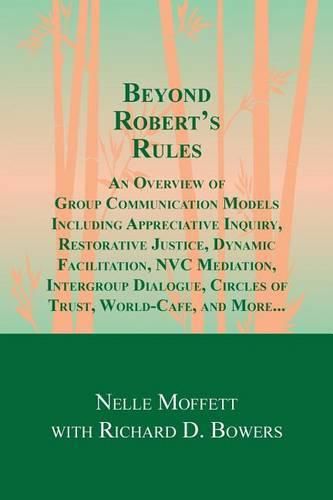Readings Newsletter
Become a Readings Member to make your shopping experience even easier.
Sign in or sign up for free!
You’re not far away from qualifying for FREE standard shipping within Australia
You’ve qualified for FREE standard shipping within Australia
The cart is loading…






This book identifies communication patterns which limit group interactions and provides examples of some alternative communication models that can open up more possibilities. This book is not an academic treatise. It is designed as a quick reference guide for professionals who want to increase their repertoire of group process models. The first part of the book presents a discussion of the power of communication models to support creativity, collaboration, and conflict resolution. Without a group process repertoire and vocabulary, people tend to remain bound by a limited set of options that produce a limited set of outcomes.
The second part of the book provides references to a collection of group process models, from basic circle models to self-organizing models for large groups, such as Open Space Technology. Each model is presented with a brief overview, applications, benefits, and a reference to a source for more detailed information.
Effective group process models give voice to multiple perspectives, alternative ideas, or new directions and expand individual participation, responsibility, enthusiasm, creativity, and well-being in the workplace and other settings. The examples of group processes provided in this book can show you a variety of ways to change old, limiting, or ineffective patterns of communication.
Intended Audience: Organizational Development professionals; Consultants; Change Agents; Business leaders (CEO, Executive leadership, meeting facilitators, team leaders, managers, supervisors); University leaders (President, Provost, managers, Faculty); Human Resources; Global government leaders; Community Action leaders; Non-Profit Social Service leaders; Environmental Activists; Social Justice activists; NGO leaders.
$9.00 standard shipping within Australia
FREE standard shipping within Australia for orders over $100.00
Express & International shipping calculated at checkout
This book identifies communication patterns which limit group interactions and provides examples of some alternative communication models that can open up more possibilities. This book is not an academic treatise. It is designed as a quick reference guide for professionals who want to increase their repertoire of group process models. The first part of the book presents a discussion of the power of communication models to support creativity, collaboration, and conflict resolution. Without a group process repertoire and vocabulary, people tend to remain bound by a limited set of options that produce a limited set of outcomes.
The second part of the book provides references to a collection of group process models, from basic circle models to self-organizing models for large groups, such as Open Space Technology. Each model is presented with a brief overview, applications, benefits, and a reference to a source for more detailed information.
Effective group process models give voice to multiple perspectives, alternative ideas, or new directions and expand individual participation, responsibility, enthusiasm, creativity, and well-being in the workplace and other settings. The examples of group processes provided in this book can show you a variety of ways to change old, limiting, or ineffective patterns of communication.
Intended Audience: Organizational Development professionals; Consultants; Change Agents; Business leaders (CEO, Executive leadership, meeting facilitators, team leaders, managers, supervisors); University leaders (President, Provost, managers, Faculty); Human Resources; Global government leaders; Community Action leaders; Non-Profit Social Service leaders; Environmental Activists; Social Justice activists; NGO leaders.